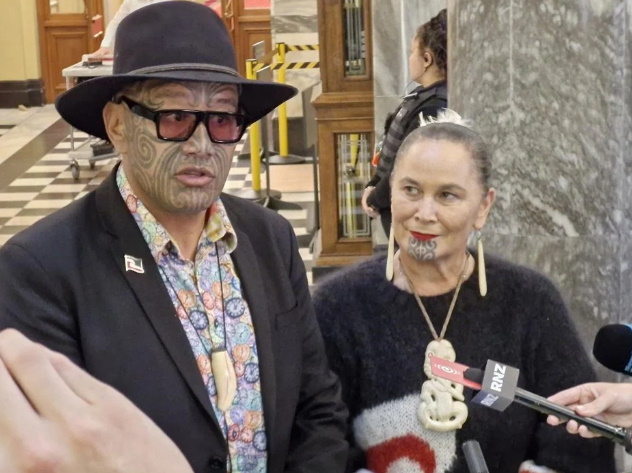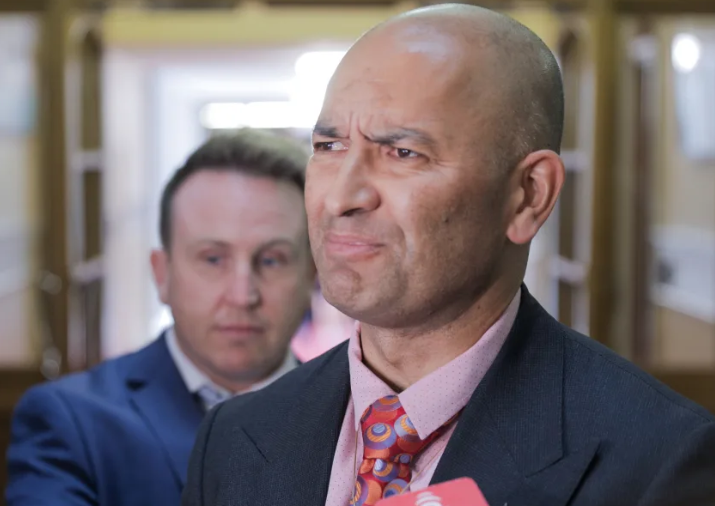National and New Zealand First voted against the bill, as they indicated they would, while Labour, the Green Party, and Te Pāti Māori also voted against the bill.
The only party to vote in favour of the bill was ACT, the ayes accounting for 11 votes, and the noes 112.
There was applause from the public gallery and Opposition MPs in the House as the Speaker announces the bill had not passed.
Speaker of the House Gerry Brownlee confirmed that following the vote permission was given for a waiata, at which the House erupted with Tūtira Mai Ngā Iwi.
Act MPs mostly left the House before it began.
One man performed a haka on his own from the public gallery at the conclusion of the waiata. Brownlee responded with some strong words, saying how "unhelpful" it was.
 Te Pāti Māori co-leaders Rawiri Waititi and Debbie Ngarewa-Packer speaking to the media. Photo: RNZ / Russell Palmer
Te Pāti Māori co-leaders Rawiri Waititi and Debbie Ngarewa-Packer speaking to the media. Photo: RNZ / Russell Palmer

Seymour responds
Seymour says despite all the debate there has not been a single statement which grappled with the content of the bill.
Asked if his party has lost in this nationwide conversation, he said they still have not heard a good argument against it.
He said he always has hope for his coalition partners, and ACT has had the courage to put an uncomfortable conversation on the agenda.
"'We'll never give up on equal rights," he said.
He said there are lots of options for continuing, and the party's approach will be made clear before the next election.
Asked about his conversations with Luxon and Peters to encourage their support, he said different people require different approaches.
Seymour said the problem with Winston Peters' view that there are no principles of the Treaty is that New Zealand First's review of treaty clauses will not touch the primary Treaty legislation.
Asked if he accepts Parliament has decided, Seymour says: "I accept that they've decided on this particular bill at this point in time."
He said he has not discussed with his coalition partners how they will progress the issue, but he has a "pretty good idea" of how it will run.
Asked if the Bill will return, Seymour responded: "Watch this space."
Te Pāti Māori to run for general seats
Te Pāti Māori says it will run candidates in the general electorate seats at the next election.
Co-leader Rawiri Waititi said the party must always be prepared for further attempts similar to this bill.
Waititi said the bill has allowed for a conversation that is ill informed and he believes there must be more education about Treaty obligations.
"I believe we haven't had the education that everybody deserves to have in relation to our constitutional arrangements."
Debbie Ngarewa-Packer said they need to be able to participate, but people do not want to be living on a nation that is divided.
The party holds six of the seven seats in Māori electorates.
'This is really just beginning'
A lawyer for Toitū te Tiriti says the fight to protect the Treaty is only just beginning - as the Treaty Principles Bill is voted down at its Second Reading.
Tania Waikato said seeing the Bill binned is a nice payoff for all the people who gave submissions against it.
She says Toitū te Tiriti are now taking aim at the Regulatory Standards Bill.
"If anything this is really just beginning. We've got the Regulatory Standards Bill that's going to be introduced at some point before June. That particular bill will do what the Treaty Principal's Bill was aiming to do, but in a different and just more sneaky way.
"So for me, that's definitely the next fight that we all gotta get up, get up for again. So for me, the fight's far from over. It's really just getting started."
Waikato said the Treaty Principles Bill has been both a waste of time and money which caused so much division.
Speeches from the reading
Labour leader Chris Hipkins began his speech by saying it is not a privilege to be speaking on the bill, because it is "a grubby little Bill, born of a grubby little deal".
He says the Bill has had a colossal impact on the fabric of the nation, and will forever be a stain on the country.
"What I do take pride in is the way New Zealanders have come together over the last six months to say loud and clear 'This is not us, this is not Aotearoa New Zealand.'
"Today, National and New Zealand First join the opposition to this bill. They can claim no victory, no virtue, and no principle. They get no credit for finally starting to fight the fire they helped to ignite."
Green Party co-leader Marama Davidson says she has never had greater FOMO - fear of missing out - than when she was being treated for cancer and unable to criticise the Bill at its first reading.
She says her speech will amplify the voices of the submitters, pointing to the record-breaking number and the 90 percent opposed.
"The people spoke, there was one clear message: Toitū te Tiriti."
She says Te Tiriti is a promise of peoples to take the best possible care of each other, echoing the sentiments of Bishop Manuhuia Bennett.
Despite Seymour's earlier assertions, she claims there has been no Bill with a record-breaking number of submissions to be met with overwhelming opposition.
"The people have spoken, and they have spoken clearly and strongly. The people are not fooled by the ACT Party."
Toitū te Tiriti lawyer Tania Waikato says she is disappointed but not surprised that Christopher Luxon is absent during the hearing of the Treaty Principles Bill.
“If you're the leader of this country and you've got a Bill in Parliament that had 300,000 submissions made on it, which broke every single record by a country mile, you would think that the leader of our country would want to be in Parliament for an occasion that big.”
She says Luxon’s absence was a clear indication of "weak leadership."
“He can’t even front up to explain why it is that the National Party let this Bill go to this point and wasted so many of our taxpayers’ dollars in doing so.”
'Cremation day'
National's Māori-Crown Relations Minister Tama Potaka said earlier he welcomes the second reading of the Treaty Principles Bill as the legislation's "cremation day".
ACT leader David Seymour, the bill's champion, was still holding out hope his coalition colleagues will change their minds at the last minute.
"They keep saying that they won't but of course, they'll always say they won't until they will," Seymour told RNZ.
The government manages business in the House and has set the Treaty Principles Bill down for second reading today - a day the Prime Minister and other party leaders generally spend away from Parliament.
Speaking at his weekly post-Cabinet meeting on Monday, Prime Minister and National Party leader Christopher Luxon confirmed he would not be at Parliament, but was happy to talk about the government legislation at some point today.

"I've explained it ad nauseam over the last few months and as I say, tomorrow I've got a meeting with iwi, a speech to do on economics and a series of other engagements."
Labour leader Chris Hipkins, who changed his schedule so he can speak on the bill this afternoon, accused Luxon of being "cowardly".
"This is the most divisive debate on race relations New Zealand has had in a generation. The Prime Minister signed New Zealand up to this debate.
"I think him running away from it shows a total lack of leadership. I think he should front up, he should explain why he agreed to this debate in the first place and he should articulate why the National Party are now voting against it."
Potaka has put his hand up for a speaking slot during the debate, but said the decision was not his to make.
He said the bill's "cremation day and nehu [burial] day are coming".
"We've been very clear. National does not support the bill past its second reading and there's been a whole host of organisations, individuals, experts, young people, rangatahi that are completely opposed to the principles bill.
"There's been a great sense of kotahitanga around that and I acknowledge that, respect it and accept that [today] it will be dealt with.
"It's dead, it's gone and [today] it will be buried."
New Zealand First leader and Deputy Prime Minister Winston Peters said he could not be there today because he was travelling to Tonga in his capacity as Foreign Affairs Minister.
Te Paati Māori co-leader Rawiri Waititi said it would be a positive day and the leaders of both sides of the House should be there to show the public they take it seriously.
"The Prime Minister allowed this type of bill to pass through the House and the harm that it's caused over the time that it was live.
"But for us, this is more about celebrating the mobilisation of our people. I think it's the most important part of this whole process."
Greens co-leader Marama Davidson said it was important Luxon fronted the legislation.
"I would expect that all of the party leaders are able to speak to this bill, especially the Prime Minister who allowed this divisive bill to come in under his watch.
"I'm really looking forward to being able to amplify the voices opposed to the Treaty Principles Bill."

The public support these principles: Seymour
David Seymour maintains his position that the majority of New Zealanders support the principles outlined in the legislation and that it was still possible his coalition partners will vote in favour of it today.
"I'm proud ACT has had the courage to put this issue on the table and I still hope that other political parties will step up too - because New Zealanders believe in these principles.
"I believe they're more ready for this debate than they're given credit for but if it's ACT alone ... I guess that in its own way will be a message to the public about who has the courage to raise these issues."
Asked about the overwhelming number of public submissions against the bill and the large protest march to Parliament in November last year, Seymour they did not reflect true public sentiment.
"That was less than one percent of New Zealanders. A lot of people submitting on a bill or going on a march can look impressive in sheer numbers. What you've got to remember is, there's five million people out there and we just don't normally see them all in one place."
"It's the same with abortion, it's the same with euthanasia. People come out in big numbers against things, but then when you actually go and ask the general public they have the opposite view. That's happened many times."
The Treaty Principles Bill will be read a second time after Question Time this afternoon.














